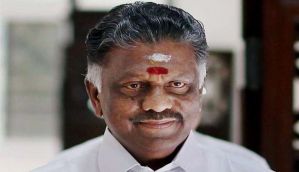IITs to triple annual fees from Rs 90,000 to Rs 3 lakh
HRD minister Smriti Irani, in her capacity as chairperson of the IIT Council, will shortly make the final decision on hiking IIT fees from Rs 90,000 per year to Rs 3 lakh a year, starting from this academic year.
On Thursday, the Standing Committee of the IIT Council (SCIC) recommended the fee hike. The fee was last increased in 2013, from Rs 50,000 per year to Rs 90,000 a year.
With salaries and overheads, the IITs spend about Rs 2,500 crore a year on about 80,000 students, reports The Economic Times.
J&K advisor says state should integrate economically with Pak, China
Khurshid Ganai, advisor to the governor of Jammu and Kashmir, believes that if the state is to be self-sufficient, it must integrate on economic terms with Pakistan, China and central Asian countries.
Ganai said this while addressing a two day conference on 'Growth and Development in Northwestern region: Issues and Perspectives' at Kashmir University, according to The Economic Times.
"If not political integration, there should be economic integration of J&K with Pakistan, China and central Asian countries to make the state economically vibrant and self-sufficient," said Ganai, who retired from the IAS last year and was recently appointed as advisor to Governor NN Vohra.
UGC anti-ragging rules make racial, casteist name-calling punishable
The University Grants Commission has issued new anti-ragging rules that crack down on race and caste discrimination and name-calling.
"The terms race, racial, ethnic, ethnicity, transgender and stalking have been brought under the regulations and anyone found guilty will face action," said a senior UGC official.
According to the Hindustan Times, if any student is found guilty of calling people 'Bihari' or 'Chinki' or discriminating against transgenders, she or he will face punishment ranging from suspension to rustication, expulsion from hostels, withholding of exam results and fines ranging between Rs 2,000 and Rs 1 lakh.
Reservations under disability bill for acid attack victims
A draft bill that will give acid attack victims disability benefits including job reservations is being considered by a group of ministers led by Home Minister Rajnath Singh.
The draft Right of Persons with Disabilities Bill will also include people suffering from schizophrenia.
Once the bill is passed, acid attack victims will find employment, something they find hard to do because of social stigma, according to The Economic Times.
Police horse Shaktiman undergoes amputation, will never walk again
Shaktiman, the Uttarakhand police horse that was attacked allegedly by a BJP MLA during a protest in Dehradun, has had to have its left hind leg amputated.
This, says Poorva Joshipura, CEO of PETA India, means that Shaktiman will never walk again. "It is a very sad situation. It will be no life at all...he is essentially dead as he cannot stand on three legs and artificial legs for horses are very complicated," said Joshipura.
BJP MP Maneka Gandhi's People For Animals has offered to take care of the horse after the amputation, according to The Economic Times.
Pathankot: Pak SIT arrives on 27 March
During a brief meeting on the sidelines of the SAARC summit at Pokhara, Nepal, external affairs minister Sushma Swaraj and Pakistan's foreign affairs advisor Sartaj Aziz decided that Pakistan's Special Investigation Team looking into the Pathankot attack will arrive in India on 27 March, after which the prime ministers of the two countries, and their foreign secretaries will meet in Washington during the Nuclear Security Summit on 31 March.
Swaraj and Aziz discussed the Jaish-e-Mohammed and the role of its chief Masood Azhar in the Pathankot attack, sources told The Economic Times.
#Shaktiman row: Ganesh Joshi sent to 14-day judicial custody
BJP MLA Ganesh Joshi, who has been accused of assaulting police horse Shaktimaan, was on Friday sent to judicial custody for 14 days. Joshi, who was arrested this morning by the Uttarakhand Police, was produced before the ACJM Court in Dhakrani at around 12:15 p.m. Meanwhile, the ruling Congress in Uttarakhand and the Bharatiya Janata Party (BJP) exchanged verbal volleys over the Mussoorie MLA's arrest. Uttarakhand Chief Minister Harish Rawat on Friday asserted that there was no 'political conspiracy' behind the arrest of Ganesh Joshi.
JNU row: Umar Khalid, Anirban Bhattacharya get interim bail for 6 months
Delhi court on Friday granted interim bail of six months to JNU students Umar Khalid and Anirban Bhattacharya. The bail plea was opposed by the police on the grounds that the two were the main organisers of the Afzal Guru event, held on the varsity campus on 9 February.
The duo, who have been lodged in jail since 23 February, sought bail on the ground of parity with JNU Student's Union President Kanhaiya Kumar. On Wednesday, additional sessions judge Reetesh Singh heard the arguments by Khalid and Bhattacharya - who said they should be given relief like Kanhaiya, considering that the probe did not call for them being placed in judicial custody.
Scientists may be one step closer to solving Bermuda Triangle mystery
Scientists now believe that they have come a step closer to solving the mystery surrounding the Bermuda Triangle. This belief has been established with the discovery of a series of underwater craters at the bottom of the Barents Sea, off the coast of Norway. It is hoped that the craters are the key for explaining the bewildering phenomenon. According to a scientist, the crater areas represent one of the largest hot spots for shallow marine methane release in the Arctic, which creates enormous blowouts of gas bubbles, leading to sinking of ships. Details of the discovery will be released at the annual meeting of the European Geosciences Union next month.
New SARS-like virus found
University of North Carolina at Chapel Hill researchers have found that the newly identified virus, known as WIV1-CoV, could bind to the same receptors as SARS-CoV that infected thousands in 2002.
They also showed that the virus readily and efficiently replicated in cultured human airway tissues, suggesting an ability to jump directly to humans. Researchers have said the capacity of this group of viruses to jump into humans is greater than was initially imagined. If the virus does jump, WIV1-CoV has the potential to seed a new outbreak with significant consequences for both public health and the global economy.







![BJP's Kapil Mishra recreates Shankar Mahadevan’s ‘Breathless’ song to highlight Delhi pollution [WATCH] BJP's Kapil Mishra recreates Shankar Mahadevan’s ‘Breathless’ song to highlight Delhi pollution [WATCH]](https://images.catchnews.com/upload/2022/11/03/kapil-mishra_240884_300x172.png)

![Anupam Kher shares pictures of his toned body on 67th birthday [MUST SEE] Anupam Kher shares pictures of his toned body on 67th birthday [MUST SEE]](https://images.catchnews.com/upload/2022/03/07/Anupam_kher_231145_300x172.jpg)






